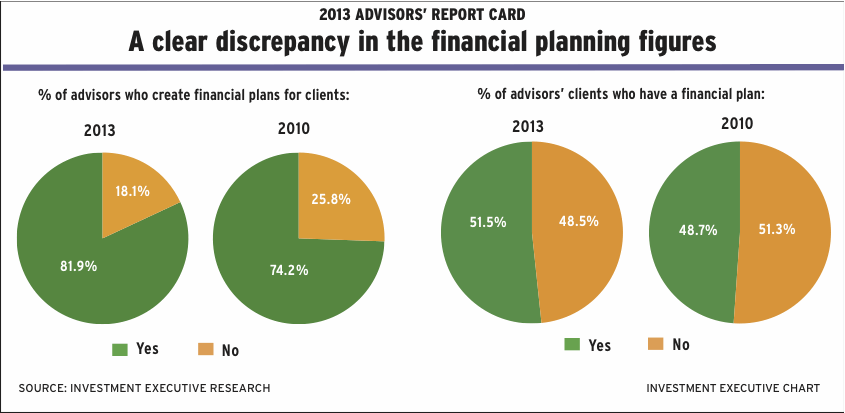
There are clear indications that financial planning has gained much prominence in the financial services industry over the past few years.
More than ever, firms are providing the support for financial planning that financial advisors need and the percentage of advisors who prepare financial plans for clients has increased steadily. However, many advisors would like to see a similar attitude change among clients, as the percentage of clients with a financial plan in place has not risen in lockstep.
These trends are evident in the numbers obtained for Investment Executive‘s 2013 Report Card series. Although the percentage of advisors who say they create financial plans for their clients has risen over the past few years, to 81.9% this year from 74.2% in 2010, the percentage of clients with a financial plan in place has risen to only 51.5% in 2013 from 48.7% in 2010.
For both firms and their advisors, financial planning is becoming more important in their endeavour to increase their share of clients’ wallets.
“The advisors who have really grown their practices significantly over the past three or four years since the meltdown are those who talk first about planning for wealth, managing wealth and protecting wealth,” says Andrew Marsh, president and CEO of Toronto-based Richardson GMP Ltd.
Richardson GMP, for its part, received a performance rating of 9.2 in the “support for developing a financial plan for clients” category. The firm makes it easy for its advisors to create financial plans for their clients.
“The process of wealth management starts with a solid financial plan discussion or a comprehensive wealth plan,” Marsh explains. “We have a couple ways to do that: some of our advisory teams have a financial planner on the team and they do the most basic projections themselves. We also have an internal tax and estate planning group that’s set up to serve the advisors and their clients.”
Establishing an internal team of experts is the approach that Toronto-based BMO Nesbitt Burns Inc. implemented recently, with much success.
“I’d say that [financial planning] is, perhaps, our No. 1 focus,” says Bill Brown, Nesbitt’s national sales manager. In particular, Brown points to the firm’s financial planning services bureau, which was launched as a pilot project a couple of years ago and then introduced nationally last year.
“It’s really picking up speed,” Brown adds. “This year, we’re adding more consultants to the bureau. And, really, this gives advisors an opportunity to have complex, sophisticated financial plans generated [for their clients] effectively.”
Although financial services firms are doing their part to ensure their advisors receive the support necessary to develop financial plans for their clients, advisors still encounter much resistance from their clients – many of whom are unwilling to co-operate in the process once they find out how much work is involved.
“Once the clients see how much detail is involved,” says an advisor in Ontario with Toronto-based Assante Wealth Management (Canada) Ltd., “they often change their minds about doing a financial plan.”
“A full financial plan is too complicated for the average client,” says an advisor in British Columbia with Waterloo, Ont.-based Sun Life Financial (Canada) Inc. “For the vast majority of Canadians, their [financial] plan is, essentially, ‘Spend less and save something’.”
Cary List, president and CEO of the Toronto-based Financial Planning Standards Council (FPSC), which develops, promotes and enforces professional standards in financial planning, is fully aware of these hurdles. He believes they can be overcome if firms spend the time necessary to educate both advisors and their clients about the importance of having a financial plan in place.
“We have a Value of Financial Planning [document], which was just published and is getting great buy-in and uptake from financial planners,” List says. “It’s [based on] a three-year study on the value and importance of financial planning for Canadians. And, in that respect, it actually provides a lot of tools to [help to] sell the importance of financial planning to the clients.”
Another vital step in removing some of the confusion regarding financial planning is to create a set of national standards for financial planning, List says, as that would help to clarify what a financial plan is and what it’s supposed to do. In fact, this is something the FPSC is currently working on.
“It’s very important,” List adds, “that if we’re ever going to reach acceptance by clients, if we’re ever going to reach a degree of confidence and trust in financial planners that we want to see in Canada, we need to find a way to ensure that when somebody talks about financial planning, we’re [all] talking about the same thing. And that’s where a single set of national standards comes in. You need to have a unified standard of understanding, of defining what financial planning is – defining what a financial planner is, defining what a financial plan is and who can do it, and what should be expected when it’s done.
© 2013 Investment Executive. All rights reserved.